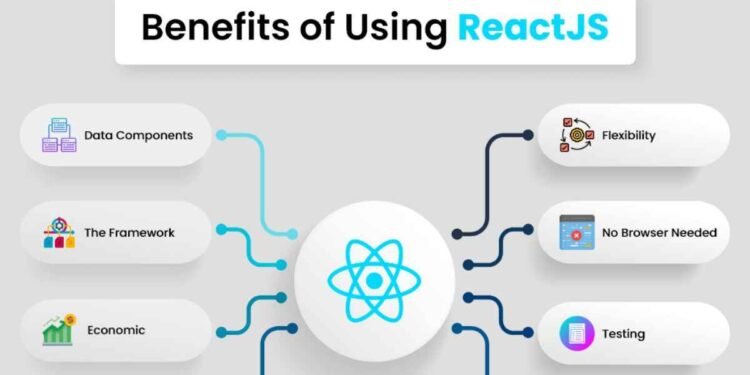1. What is ReactJS?
Ultimate Guide to ReactJS: Features, Benefits, and Why It’s Popular ReactJS is an open-source JavaScript library used for building user interfaces, especially for single-page applications (SPAs). Developed by Facebook, ReactJS allows developers to create reusable UI components, making the development process more efficient and scalable.
2. Why Was ReactJS Created?
Facebook created ReactJS in 2013 to solve performance issues in web applications. The main goal was to create a fast, scalable, and flexible library that could efficiently update and render the right components when data changes.
3. Key Features of ReactJS
- Component-Based Architecture – Breaks the UI into reusable components.
- Virtual DOM – Improves performance by updating only changed elements.
- JSX (JavaScript XML) – Allows writing UI components using HTML-like syntax.
- Unidirectional Data Flow – Enhances predictability and debugging.
- React Hooks – Enables state management without writing class components.
4. How ReactJS Works: Virtual DOM and Components
React uses a Virtual DOM, which is a lightweight copy of the actual DOM. Instead of updating the entire webpage when a change occurs, React updates only the modified components, making the application faster and more efficient.
5. Benefits of Using ReactJS
- Fast Performance – Thanks to Virtual DOM.
- Reusable Components – Saves time and effort in development.
- Strong Community Support – Many developers contribute to its growth.
- SEO-Friendly – Works well with search engines compared to other JavaScript frameworks.
- Easy to Learn – Especially for those with JavaScript knowledge.
6. ReactJS vs. Other JavaScript Frameworks
| Feature | ReactJS | Angular | VueJS |
| Learning Curve | Easy | Moderate | Easy |
| Performance | High | Moderate | High |
| Flexibility | High | Low | High |
| Community Support | Strong | Strong | Moderate |
7. How to Get Started with ReactJS?
- Install Node.js and npm.
- Use Create React App:
npx create-react-app my-app cd my-app npm start - Start building components and using React’s powerful features.
8. Popular Use Cases of ReactJS
- Social Media Platforms – Facebook, Instagram.
- E-commerce Websites – Shopify, Amazon.
- Single Page Applications (SPAs) – Gmail, Trello.
- Dashboards and Data Visualization – Used in fintech and analytics apps.
9. ReactJS Community and Ecosystem
ReactJS has a huge ecosystem with tools like Redux for state management, React Router for navigation, and Next.js for server-side rendering. Its active community ensures constant improvements and support.
10. Future of ReactJS
ReactJS continues to evolve with new features like Concurrent Mode, Suspense, and Server Components, making it even more powerful and efficient for future web applications.
Conclusion
Ultimate Guide to ReactJS: Features, Benefits, and Why It’s Popular ReactJS has revolutionized web development with its efficiency, flexibility, and reusability. Whether you are building a simple website or a complex application, ReactJS provides the tools needed to create a fast, responsive, and engaging user experience. With its active community and continuous improvements, ReactJS remains one of the most popular choices for modern web development.
FAQs
1. Is ReactJS a framework or a library?
ReactJS is a JavaScript library, not a framework, primarily used for building user interfaces.
2. What makes ReactJS different from other JavaScript libraries?
ReactJS uses a Virtual DOM, component-based architecture, and unidirectional data flow, making it faster, scalable, and more efficient.
3. Do I need to learn JavaScript before ReactJS?
Yes, having a basic understanding of JavaScript is essential before diving into ReactJS.
4. Can I use ReactJS for mobile app development?
Yes! React Native, a framework based on ReactJS, is used for building mobile applications for iOS and Android.
5. Is ReactJS good for SEO?
Yes, ReactJS can be SEO-friendly, especially when combined with server-side rendering techniques like Next.js.


















